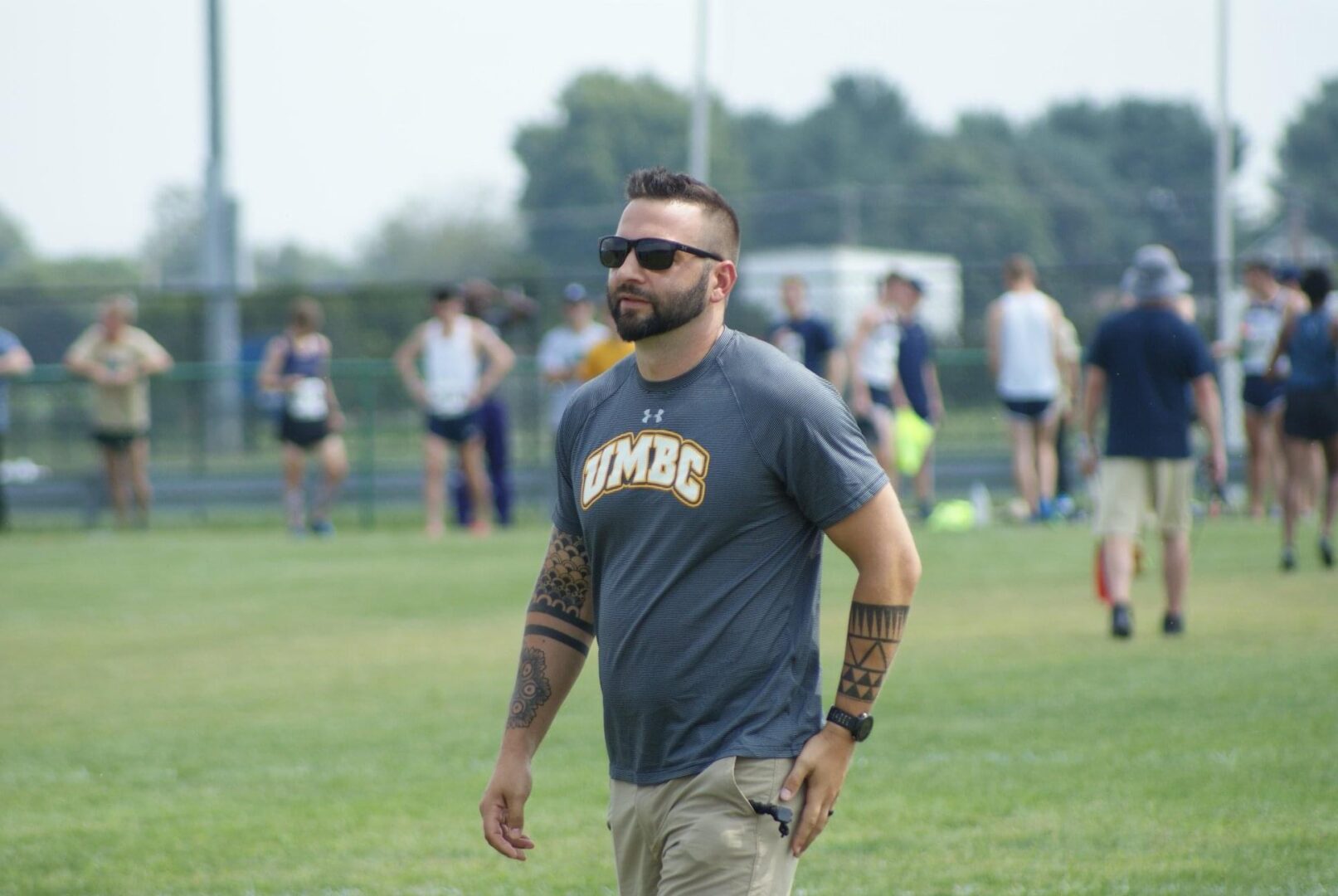UMBC
1000 Hilltop Circle Baltimore, MD 21250
Head Coach: Matt Gittermann
410-218-1551
https://www.umbcretrievers.com/sports/mxc/coaches/gitterman_matt?view=bio
https://www.umbcretrievers.com/sports/mtrack/2019-20/files/XCTF_Records_2-6-20.pdf
Officially known as “the funniest guy in the world,” Matt Gittermann is the head cross country coach and assistant track coach (distance) for UMBC. In 2013, the men’s team won the America East Cross Country Title, and in 2015, Hassan Omar (Thomas Johnson HS) finished 27th overall at the NCAA Cross Country Championships. The men have been ranked seven times in the Mid-Atlantic region and the women have been ranked four times in the mid-Atlantic region in the past twelve years. In 2014, Gittermann coached Andrew Smith to All-American in the 800 meters at the indoor NCAA Championships. For both track and XC, the UMBC coaching staff has been recognized as the American East Coaching Staff of the Year six times since 2013. Gittermann also writes for Techniques Magazine, a publication of USTFCCCA.
Chasing The Standard:Â Can you give us a brief background/some highlights of your program over the past few years?
Gittermann: It’s been a youthful rebuilding process the past couple years that was definitely hurt by the loss of the outdoor season. We had a special group last year of freshmen and sophomores coupled with some talented seniors that was going to culminate in a big outdoor season for us but alas. It was a tough pill to swallow for a bunch of kids that had built up over four years with this year in mind and the carpet was taken from underneath them. We had four to six kids last year that I felt had a good shot to make the preliminary round of NCAAs.
CTS:Â What goals do you have for the program?
Gittermann: More than anything else, I want kids to develop into stronger individuals overall. Not necessarily physically, but mentally and emotionally. I want to make sure they have the skills they need to thrive in a world that has been less kind to students graduating college this past decade. And if in that process we have success at an athletic level then that’s a bonus.
CTS: Since it would normally be xc season right now, what would a typical training week look like for your team? Do you have a general overarching training philosophy?
Gittermann: The over arching training philosophy is being athlete centric. We have a general training that requires the athletes to do some introspective learning about what training works best for them and engage in conversations with us, the coaching staff, to make necessary adjustments so we can build on our strengths. It requires that athletes take an active interest in their development and reach out more in regards to communication, and those that do, tend to succeed above their initial ability levels.
For the fall we have been in a holding pattern of general training as we still don’t know if we will have an indoor season or winter cross country season. So we have been doing a little bit of everything so far but I think we are going to shift to more XC centric stuff after Thanksgiving as our belief is it’s the season with the best chance of occurring.
CTS:Â How was the 2 mile time trial you had recently?
Gittermann: It was good in the sense that we reminded kids why they were training. We tried to make it as “race-like” as possible with a clock, lap counter, last lap bell, and music just to jog their memory of what competition looks like. More than anything we wanted to get a gauge of everyone’s fitness to guide training going forward. The women as a whole are older so they were near peak form despite not having training designed for that. The men, who are over-whelming underclassmen, showed that they needed the extra time to develop as one would expect.
CTS:Â You’ve written a couple article on training and injury prevention:
https://e.issuu.com/embed.html#32344549/66260784
https://e.issuu.com/embed.html#32344549/66260870
How do you incorporate all the extra things like nutrition and cross training that many high school runners don’t consider, and how do you transition high school athletes to be more conscious of these things?
Gittermann: This year has been a bit of a challenge because we usually spend the first few days at cross country camp which is a learning intensive endeavor where we go over a lot of this in detail then follow up daily. We had to take the camp virtual, and now we only meet three days a week so much of this has been put on the side burner while we work towards normalcy again. We are about to break again for the winter session so I think we are going virtually, so we will put more emphasis on these things since our time won’t be taken up by training.
In regards to cross training, it’s built into the system, as they can access it wherever. But you do need to teach them cross training is only a substitute for the impact not the intensity.
CTS: What does the recruiting process look like at UMBC? Are there specific time standards or something in particular you look for in a recruit? How is the process now given the limitations due to COVID?
Gittermann: We look across all ability levels from kids who can make an impact right away to kids who may need a year to taking a chance on kids who may or may not pan out. Like many schools, we have a list of standards we want kids to meet, but we do try to find unique kids-say the fastest kid at a school that never has distance runners as those kids have worked out well for us in the past.
Recruiting has definitely been weird, as we can’t have visits or go see kids run. But we’ve brought kids in for virtual visits via Google Meets during practice to having kids send us videos of them doing solo time trials. The cottage industry of club meets that have popped up this fall have been helpful for some but there has been a large majority of kids who don’t feel comfortable competing in these. So we’ve gone out of our way to really learn about the kids at a deeper level than we normally have to see if they have the mental fortitude to make a contribution since they don’t have the times that usually catch our eye.
CTS:Â What recommendation would you give to someone interested in competing for UMBC?
Gittermann: Grades. Grades. Grades. Grades. Academic as in terms of admission, scholarships (both athletic and academic), and academic success have separated us from a lot of schools where they have more leniency to get kids in and more pathways for them to slip by. In addition to that, we are looking for kids who can communicate. So much of our system is based on little 2-5 minute conversations that those kids who are unwilling to communicate get left behind at times.
Recruiting Questionnaire:Â https://

